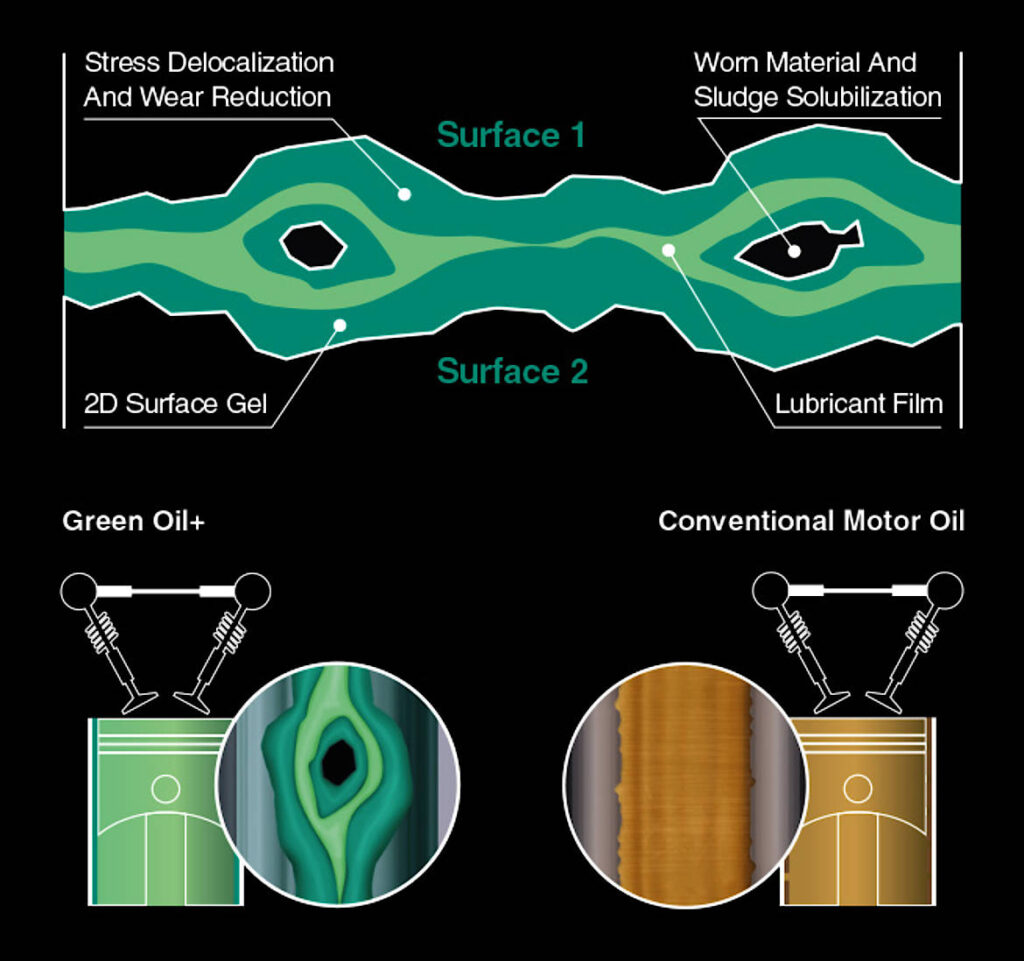Green Oil+
BIZOL Green Oil+ meet the arduous requirements of city traffic
Modern cars require high quality engine oils to provide adequate engine protection and comply with emission and fuel economy regulations.
These regulations were first introduced in the 1960s and gradually tightened until 2010. At this time, fuel economy targets were introduced that see fuel economy for cars going from 28 mpg to 55 mpg by 2025. In order to meet these tougher technical requirements, auto manufacturers require low friction motor oils that ca withstand greater pressures, higher temperatures and last longer. These oil requirements are covered by tighter API motor oil requirements for gasoline and diesel vehicles, and higher ACEA requirements for European-sourced vehicles.
Gone are the days when it was possible to use almost any commercially available oil. Motorists now have to take care to select oil suited to their vehicles. Compounding the problem is the fact that more motorists are living in conurbations where driving conditions are arduous and not conducive to long oil life.
Many motorists drive in or through large urban centers, with all the delays and congestion that implies. Already, in large cities the average driving speed is between 16 and 25 mph and can be expected to get worse.
Green Oil Concept Envisioned
Boris Tatievski studied physics and chemistry and completed his studies at the Freie University in Berlin where his thesis was on the dynamics of clusters of molecules. As a believer in the concept of open innovation, where new products are developed through collaboration, he contacted his former professors and classmates and they began working on formulations to find a way to make oil that lasted longer under the arduous conditions found in congested cities. It was not long before several formulations were developed and, after thorough testing, launched as Bizol Green Oil.
Added Protection of BIZOL Green Oils
Impact on Engine Life
Driving in congested traffic represents a completely different situation for engines as overdesigned cooling systems have difficulty maintaining optimum engine operating conditions. Typically, in slow moving traffic the following can be expected:
• Engines do not heat up properly during short runs
• Oil temperatures do not reach normal
• Oil pressure is low due to low engine speeds
• Frequent starting and stopping
• Engines spend a significant amount of time idling
These conditions are tough on engines and lead to premature engine wear due to the following:
• Oil dilution by fuel, reducing lubricating ability of oil.
• Poor lubrication because oil is too viscous when cold.
• Poor lubrication at start up.
• Increased wear and metal to metal contact due to poor lubrication.
• Corrosion due to acid formation from moisture condensing in the engine on short trips.
• Formation of sludge.
The US disposes of 1.3 billion gallons/4.9 billion liter of used motor oil every year. Although most is recycled, 13 per cent is improperly disposed of. Used motor oil contains potentially harmful contaminants and is a source of ground water pollution. Although used oil can be recycled, nearly half is lost during this process.
The use of synthetic oil could halve the amount of oil that needs to be disposed, reduce ground water pollution, and reduce energy requirements needed to produce and recycle oil unnecessarily.
BIZOL Green Oil further contributes to the environment by reducing wear in engines, leading to fewer emissions and longer engine life.
BIZOL Green Oils are manufactured to API SN/CF requirements as wells as to ACEA A3/B3 specifications and can be safely used in any vehicle requiring oil to either of these specifications. Some European manufacturers also require compliance with their own specifications, and these should be adhered to.
It is important that viscosity recommendations are followed as specified in the vehicle handbook. The most important value is viscosity under running conditions; a 5W-30 has a viscosity value of 30 at operating temperature. The first figure represents the cold viscosity; lower figures indicate the oil can be used in colder conditions. 5W oil meets minimum requirements for US winter conditions.
If the required viscosity is not available, it is better to go with thinner oil, rather than a thicker one. The reason is simply that thicker oil cannot flow properly though the engine, especially when cold and oil starvation may occur.
BIZOL recommends that BIZOL Green Oil used in arduous conditions be changed every 15,000 miles. This recommendation is in stark contrast with the traditional approach advocated by many mechanics that in arduous conditions oil should be changed every 3,000 miles.
When oil refining techniques were not as advanced as they are today and additive packages not as refined, regular oil changes ensured longer engine life. However, modern lubricating oils manufactured to current API and ACEA specifications have highly developed additive packages which last much longer. Oil contamination has been reduced because engines are manufactured to tighter tolerances and fitted with sophisticated injection systems that prevent over fueling. Together, these dramatically reduce the level of oil contamination and degradation.
Synthetic oils take this a step further because oil molecules are more stable and of uniform length, which obviates the need for viscosity index improvers. These oils do not thicken like mineral oils and retain viscosity characteristics even with extended use. Additive packages are designed for long life; the ACEA A3/B3 specification is specifically designed for extended oil change intervals, a requirement met by BIZOL Green Oil.
Many North American and European auto manufacturers now recommend oil changes every 10,000 miles, 15,000 miles, 18,000 miles, or every two years because of the use of high-quality synthetic oils. Motorists using these oils can confidently extend oil change intervals to comply with recommendations of motor manufacturers and dispense with the outdated concept of oil changes every 3,000 miles.
















